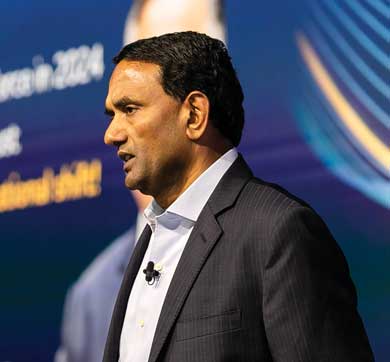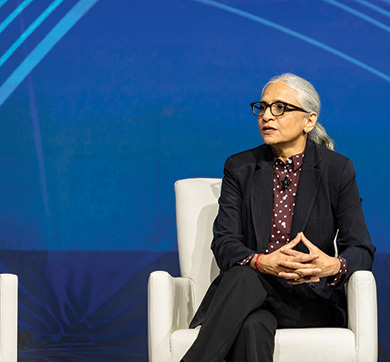November 2025 | 3260 words | 12-minute read
From the boardroom at its headquarters in India to its offices, delivery centres, and innovation hubs in 55 countries across six continents, Tata Consultancy Services (TCS) — the company that has been emblematic of India’s rise as a global IT services bellwether — is quietly coding the next chapter of its global technology leadership. A chapter where generative AI (GenAI), quantum technologies, digital sovereignty, cybersecurity, sustainability, and geopolitics are not just buzzwords, but existential imperatives.
TCS has weathered many a technological and geopolitical storm in its journey of 50+ years, but the present moment is unprecedented on both fronts. “Financial year 2025 was a year of profound global disruption…,” Tata Sons Chairman N Chandrasekaran noted in TCS’ FY25 annual report. “…The evolving geopolitical landscape and the emergence of a multipolar world are now reshaping how global businesses operate. We are witnessing the rise of new paradigms, demanding a thorough reimagination of systems, processes, and technologies to improve visibility, reduce costs, and enhance operational throughput.”
"GenAI is not just another tech cycle — it is a civilisational shift." – N Chandrasekaran, Chairman, Tata Sons
As the tectonic plates shift beneath the global economy, TCS is not content to merely adapt to change. It is “proactively leading this change,” said Mr Chandrasekaran — betting big on AI, cloud, sustainability, and the perpetual reinvention of itself and its clients.

Age of perpetual adaptiveness
The phrase ‘perpetually adaptive enterprise’ is more than a slogan for TCS. It is the blueprint to turn disruptions into strategic advantages and thrive, not just survive, in an uncertain world.
“Adaptability starts at home,” says K Krithivasan, Chief Executive Officer and Managing Director, TCS. “Our focus on operational excellence, the Global Network Delivery ModelTM, agile workforce strategies, and a culture that thrives on continuous learning enable us to pivot quickly, whether to new client demands or macroeconomic shifts.”
Adaptability is also a strategic capability that the company delivers to its clients in measurable ways. By designing digital platforms that are scalable and cloud native, ensuring business models are not locked into legacy constraints. By embedding data-driven decision-making and AI, giving clients the agility to sense and respond in real time. By supporting talent transformation at scale. And by helping enterprises reimagine operating models, balancing efficiency with resilience.
"We are witnessing the rise of new paradigms, demanding a thorough reimagination of systems, processes, and technologies to improve visibility, reduce costs, and enhance operational throughput." - Mr N Chandrasekaran
For Aarthi Subramanian, who returned to TCS in May 2025 as Executive Director – President and Chief Operating Officer, ‘perpetual adaptiveness’ means building enterprises that sense, learn, and pivot with speed.
From her vantage point at the helm of all the service lines, she notes, “Our Perpetually Adaptive Enterprise blueprint embeds this into every transformation journey. We bring together domain consulting, scalable engineering, and open ecosystems to modernise core platforms, enable data-driven decision-making, and accelerate innovation. The blueprint is anchored on five pillars: human-centred AI, responsive supply chains, intelligent operations, digital sustainability, and a continuously learning workforce.”
The growing demand for perpetual adaptiveness across industries and the willingness of enterprises to invest in it was a central theme at the TCS Earnings Call in July 2025. It was noted that enterprises are increasingly seeking dependable partners who not only offer the right capabilities, but also possess the scale and maturity to navigate a dynamic environment. “TCS aims to be that partner,” Mr Krithivasan had noted. “…In this context, we are very confident in the robustness of the demand as well as the strength of our business model from a medium to long-term perspective. Adaptability, therefore, is both an organisational muscle and a client offering that defines TCS’ role in the digital economy.”
The Big Bets
This dual role of adaptability — as a core strength and a client-facing capability — becomes even more critical in light of the five big bets that TCS is making to stay ahead of the curve.
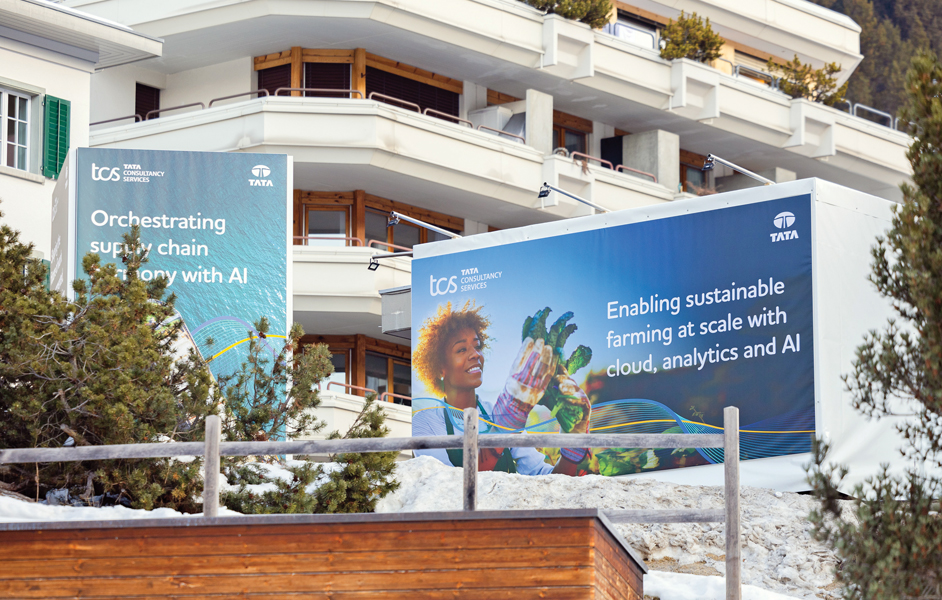
The first big bet is AI-led transformation. “The single most transformative force in 2024 was generative AI. GenAI is not just another tech cycle — it is a civilisational shift,” noted Mr Chandrasekaran in TCS’ FY25 annual report, capturing both the urgency and unprecedented scale of the AI-driven transformation underway across industries, economies, and societies.
For context, ChatGPT reached 10 crore monthly active users just two months after its launch — years quicker than both Instagram and Netflix — making it the fastest-growing consumer application in history. In just two years, GenAI achieved global usage levels that took smartphones three years, the Internet five years and PCs a full 12 years! Global AI spending, meanwhile, is projected to soar past $1.5 in 2025 and cross the $2 tn threshold in 2026.
TCS is driving AI-led transformation by guiding enterprises from pilot projects to enterprise-wide adoption, with a focus on explainability, ethics, and measurable ROI. “Across industries, clients are increasingly shifting their focus from a use case-based approach to ROI-led scaling of AI,” says Mr Krithivasan. “We support our clients in multiple ways.”
This includes establishing AI centres of excellence for scalable enterprise AI strategies; setting up AI labs to collaborate with clients on technology experimentation; building safe, secure, scalable GenAI as a service platform; deploying 150+ AI agents to provide domain-specific AI solutions for business operations; delivering GenAI-infused services for software engineering, IT operations, technology modernisation, and cybersecurity, and setting up a sovereign, secure cloud environment with integrated AI. (See box: Eye on AI)
"Adaptability starts at home. Our focus on operational excellence, the Global Network Delivery ModelTM, agile workforce strategies, and a culture that thrives on continuous learning enable us to pivot quickly, whether to new client demands or macroeconomic shifts." - K Krithivasan, Chief Executive Officer and Managing Director, TCS
The second bet is cloud, which is positioned as the digital backbone, with sector- and region-specific solutions like TCS’ sovereign cloud offerings that balance agility, regulatory compliance, and faster innovation.

The third is cybersecurity, which is embedded into every transformation initiative, securing multi-cloud and hybrid environments with a proactive, design-first approach.
The fourth is IoT and digital engineering, where TCS is reimagining products and platforms through connected technologies and smart engineering. It recently launched Chiplet-based System Engineering Services, designed to help semiconductor companies push the boundaries of traditional chip design and deliver faster, more efficient, and powerful processors. The launch comes at a time when global demand for advanced semiconductors is soaring, and India’s semiconductor market, valued at $45–50 bn in 2024-25, is projected to more than double to $100–110 bn by 2030.
And the fifth bet is Enterprise Solutions, which leverages the investments being made by businesses “in modernising their digital core with AI-infused next-gen technologies,” says Mr Krithivasan. “These programmes are typically business transformation programmes and not just system upgrades. We have established strong partnerships with technology providers and are building industry-specific solutions for accelerated value realisation by our clients.”
“Each of these,” he adds, “is being operationalised in ways that deliver both immediate value and long-term advantage for clients.”
The most significant push, unsurprisingly, is on AI. Mr Krithivasan recently unveiled a new ambition for TCS — to become “the world’s largest AI-led technology services business”, supported by a five-pillar strategy to enable this.
TCS has started gaining momentum on all other fronts too. One aspect has been to deepen its strategic alliances with cloud hyperscalers. For example, TCS recently became the founding partner in adopting Google Cloud’s new agentic AI platform, Gemini Enterprise, to accelerate the deployment of domain-specific AI agents on client cloud platforms. Clients have already started to benefit from this alliance. FairPrice Group, a leading Singapore retailer, brought Store of Tomorrow to life with the Grocer Genie Portal, enabling agentic AI-driven store operations. CME Group, the world’s leading derivatives marketplace, accelerated legacy code modernisation by 20% through Google’s Gemini Code Assist, driving faster migration, improved code quality, and enhanced productivity across development teams.
The Enterprise Solutions unit received a significant boost with TCS’ recent acquisition of ListEngage, a US-based firm, strengthening its capabilities on the Salesforce platform.
Riding on the bets, TCS’ total contract value (TCV) in Q1 FY26 was $9.4 bn, up 13.2% year-on-year (YoY), and $10 bn in Q2 FY26, a sequential increase of 6.5% and a YoY growth of 16%.
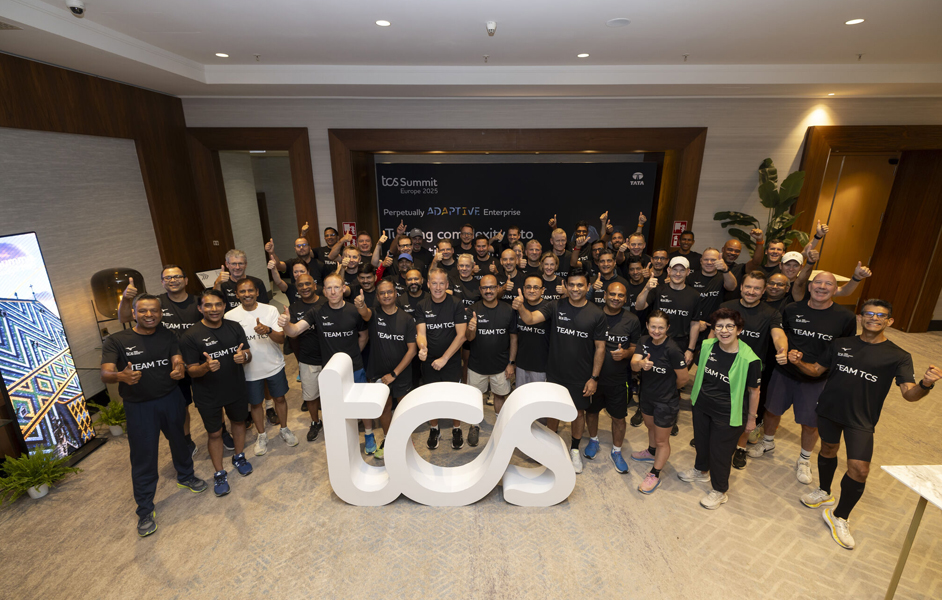
TCS also views digital as a key enabler for achieving net-zero — on the one hand driving its own commitment to green IT practices and modernising its infrastructure in line with net zero goals, and on the other, helping clients embed sustainability into their business models.
The company is aligning its technology strategy with the global transition to green energy in multiple ways. AI and cloud are being applied to optimise energy usage, monitor carbon footprints, and design smarter supply chains. For instance, AI-driven analytics help enterprises forecast and reduce energy consumption, while cloud-native platforms enable transparent environmental, social, and governance (ESG) reporting at scale. TCS is also extending this commitment through industry collaborations, like its partnership with Rolls-Royce to research hydrogen fuel system technology, advancing the potential of hydrogen as a zero-carbon aviation fuel.
“Sustainability is no longer a parallel agenda; it is at the core of every client transformation,” says Mr Krithivasan.
To sharpen this strategic focus for the decade ahead, TCS has introduced the role of Chief Strategy Officer (CSO). It underscores the company’s commitment to proactively navigating future industry shifts and aligning capabilities to lead wherever change unfolds. The CSO also leads the Global Consulting Practice and oversees the M&A functions, bringing together strategic foresight and executional agility.
Innovations at Scale
Central to TCS’ future readiness is its global network of innovation hubs. The TCS PaceTM network now includes nine Pace PortsTM — in Tokyo, Amsterdam, New York, Pittsburgh, Toronto, London, São Paulo, Singapore and Paris — and five Pace Studios in Riyadh, Sydney, Letterkenny, Stockholm, and Manila. All of these are being reimagined to become AI-experience centres. The newest ones — in São Paulo and Singapore — already have an AI research mandate.
Apart from these, TCS also runs many purpose-specific labs, for example, a wide range of Cybersecurity Threat Management Centers and an IoT lab in Cincinnati, Ohio.
"We embed innovation into the full life cycle, from discovery to scaled delivery and bring it to life by co-creating with clients in our global TCS Pace Port™ network." - Aarthi Subramanian, President and Chief Operating Officer
“Each hub is connected to local ecosystems like Cornell Tech at the Tata Innovation Center in New York and Carnegie Mellon University in Pittsburgh, ensuring access to cutting-edge research and talent,” says Ms Subramanian. “These centres bring together design, prototyping, and delivery teams to validate ideas against business KPIs before scaling. By collating learnings across markets, we make breakthroughs globally relevant, helping clients innovate and stay future-ready with TCS for the long run.”
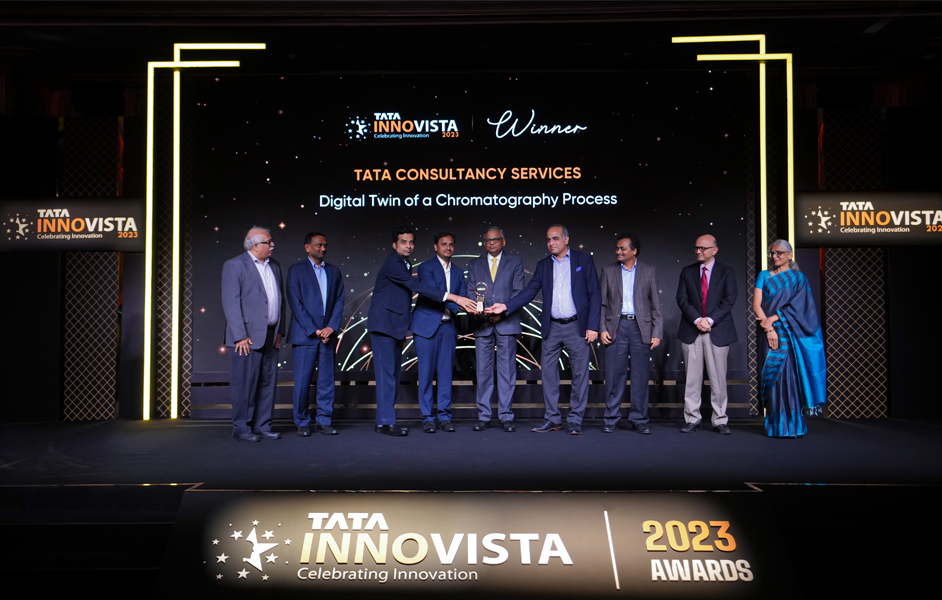
The coming together of technology, ecosystems, and clients at these centres facilitates co-innovation in real time, testing AI applications in context, and scaling successful solutions quickly. In a fast-changing environment, they act as both sensors to the future and accelerators for client impact. “We embed innovation into the full life cycle, from discovery to scaled delivery and bring it to life by co-creating with clients in our global TCS Pace Port™ network,” adds Ms Subramanian.
The researchers affiliated with these centres have been very active in creating new patents for TCS — 8,816 patents have been filed so far, of which 4,820 have been granted, exemplifying the scale of innovation at work. The innovation hubs, thus, also play a key role in shaping TCS’ own talent, exposing associates to new challenges and creating a culture of innovation — furthering the company’s transformation journey with the Human+AI operating model firmly at the heart of its future readiness.
Human+AI: The New Operating Model
For TCS, the Human+AI model represents a paradigm shift in how work is done. “We see Human+AI as a symbiotic partnership, where AI enhances human judgement, speed, and precision without replacing what makes us inherently human,” says Ms Subramanian.
This model is already reshaping operations across industries. In manufacturing and banking, the GenAI- and Agentic AI-powered TCS MasterCraft™ has modernised legacy systems, reducing costs by over 70% and delivering results twice as fast, while keeping human oversight integral. In retail, the AI-driven TCS Optumera™ optimises store layouts, pricing, and assortment, but final decisions still rest with merchandisers who understand brand nuance and customer behaviour. Enterprise-grade GenAI platforms like TCS AI WisdomNextTM 2.0 act like intelligent collaborators, driving process automation and customer interactions at scale, in close cooperation with human operators.
As these capabilities evolve, they will improve risk, supply chain, and research functions through AI-assisted human decision-making. We see it as a partnership where AI delivers scale, speed, and predictive power, while humans provide contextual judgement, ethical reasoning, and creativity.” - Ms Subramanian.
TCS is parallelly making significant investments in innovation and research on this paradigm. Its Pace Port™ in Paris houses a first-of-its-kind Human-Centric AI Center of Excellence. It has also launched a new research series in collaboration with MIT Sloan Management Review to explore the next phase of Human+AI collaboration in large enterprises.
“As these capabilities evolve, they will improve risk, supply chain, and research functions through AI-assisted human decision-making,” adds Ms Subramanian. “We see it as a partnership where AI delivers scale, speed, and predictive power, while humans provide contextual judgement, ethical reasoning, and creativity.”
In the Long Run
In a rapidly changing world, TCS has strategically evolved its brand by positioning itself as a long-term, trusted transformation partner. Earlier this year, the company became the second global IT services brand to cross the $20 bn mark in brand value, with a valuation of $21.3 bn, according to Brand Finance — an 826% growth in brand value over 15 years!
Nothing captures this journey better than a marathon — a sport around which the company has strategically built its brand. With 14 global marathon partnerships, including five of the top seven Abbott World Marathon Majors, the TCS brand is visible on some of the world’s biggest stages today. TCS sponsored marathons also generated a $2.25 bn impact on their local economies in 2024, while raising $279 mn for charitable causes.

“The marathon is a powerful metaphor for TCS; we are in it for the long run,” says Mr Krithivasan. “It stands for endurance, adaptability, and collective achievement. Beyond visibility, the marathon aligns deeply with our strategy. First, it reflects our belief in long-term partnerships and sustained outcomes, rather than short-term gains. Second, it connects us with communities worldwide, showcasing TCS as a people-centric brand. Third, we infuse technology into these events, from race apps to AI-powered running assistants and even digital twin-led insights of athlete performance, demonstrating that TCS is not only a sponsor but also a technology innovator.”
"The marathon is a powerful metaphor for TCS; we are in it for the long run. It stands for endurance, adaptability, and collective achievement." - Mr Krithivasan
As TCS looks to the future, its vision is clear: to be a trusted partner in shaping a technology-driven world that is inclusive, sustainable, and transformative.
“For industries, this means reimagining value chains with AI, cloud, quantum, and digital twins, creating enterprises that are more adaptive, resilient, and customer centric,” says Mr Krithivasan. “For communities, it means applying our scale and expertise to bridge digital divides, enable education and skilling, and build solutions that reach the last mile. For the planet, it means aligning all our technology strategies with sustainability, ensuring we help clients and ourselves transition to a green economy. We see our role not as a participant but as a shaper of this future by co-creating solutions with clients, governments, and ecosystems worldwide.”
In an era defined by disruption, TCS is not only determined to run the marathon — betting on endurance, adaptability, and purpose — but to lead.
Eye on AI
In TCS’ earnings call for the quarter ending September 2025, Mr Krithivasan set the goal for the company to become the “world’s largest AI-led technology services company”.
Subsequent to the call, Ms Subramanian added, “We are doing this by bringing AI close to both customers and employees and making it real.”
- TCS is investing in building a 1GW capacity AI data centre in India.
- TCS WisdomNext™ is an industry-first GenAI aggregation platform that offers ready-to-deploy solution blueprints, making it simpler for large organisations to quickly adopt GenAI solutions.
- It launched TCS SovereignSecure CloudTM, TCS DigiBOLTTM, and TCS Cyber Defense Suite, marking the beginning of solutions tailored to India’s unique digital needs.
- The company expanded its partnership with Google Cloud to offer two AI-powered cybersecurity solutions — TCS Managed Detection and Response and TCS Secure Cloud Foundation.
- TCS embedded NVIDIA AI Enterprise software into its bouquet of retail products and solutions to drive innovation, differentiation, and growth for retailers worldwide. Through the partnership, TCS is infusing NVIDIA’s advanced AI, computer vision, and digital twin capabilities into its retail offerings.
- In 2025, TCS launched the tcsAI Hackathon globally. With 2,81,000+ employees participating from across 58 countries in the first edition, it made history as the world’s largest AI hackathon.
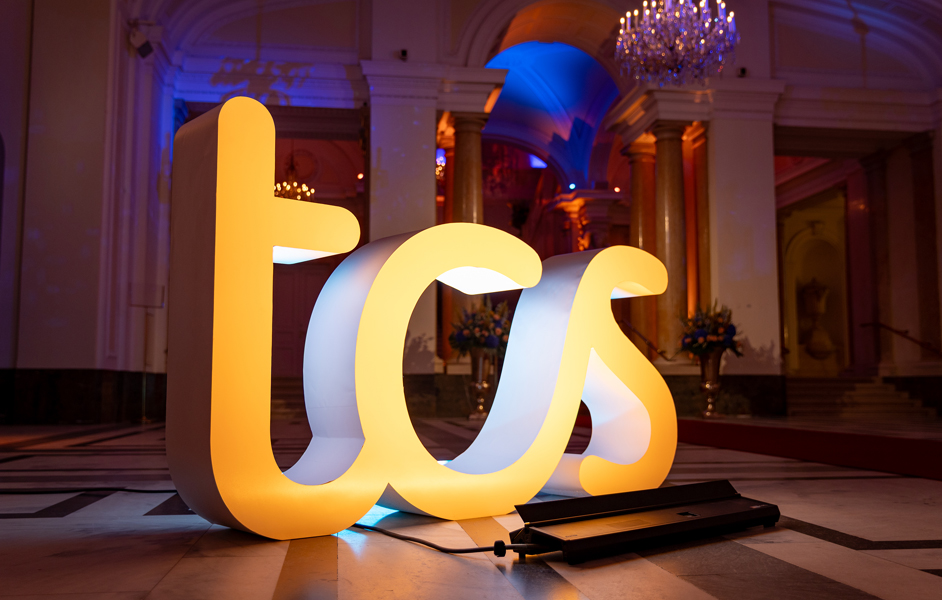
POWERING THE BIG BETS
AI-led transformation
Market potential: $450 bn* serviceable available market (SAM) in FY28
Key offerings
- Generative and agentic AI orchestration platform: TCS AI WisdomNextTM
- AI-led IT platforms: ignioTM, TCS MasterCraftTM, JileTM
- AI-led business process service solutions: TCS CognixTM
Key partnerships
- Model providers: OpenAI, Anthropic, Meta, Mistral AI
- Hardware acceleration: NVIDIA, AMD, Intel
- Data platforms: Databricks, Snowflake
- AI application development: Vian.ai, Kore.ai
Cloud
Market potential $624 bn SAM in FY28
Key offering
- TCS SovereignSecure CloudTM
Key partnerships
- AWS, Azure, Google, Oracle, HP, Dell, NVIDIA, AMD, Intel
Cybersecurity
Market potential: $100 bn SAM in FY28
Key offering
- TCS Cyber Defense Suite
Key partnerships
- SailPoint, CyberArk, Palo Alto Networks, CrowdStrike, Google (and Wiz), Snyk, Zscaler
IoT and digital engineering
Market potential: $329 bn SAM in FY28
Key offerings
- TCS InTwinTM, TCS Image and Video Analytics Toolkit, TCS DigiFleetTM,
- TCS Digital Manufacturing Platform
Key partnerships
- Dassault, Siemens, PTC, Aveva, ABB, Critical Manufacturing
Enterprise solutions
Market potential: $378 bn SAM in FY28
Key offering
- TCS Crystallus™
Key partnerships
- SAP, Salesforce, ServiceNow, Oracle
Sustainability
Market potential: $55-60 bn in FY28
Key offerings
- TCS Intelligent Urban ExchangeTM, an AI-powered sustainability management and climate platform for enterprises and smart cities
- TCS Clever EnergyTM, an AI-powered energy platform for resilience, portfolio management, and transition
- QuartzTM, a tokenisation platform for ESG compliance
- TCS EnvirozoneTM, TCS Green & Connected Ecosystem solutions, TCS Product Life Cycle Profiler, for circularity, supply chain, and ecosystem
- TCS Digital Food Initiative, an AI-powered nature platform for agri, forestry, biodiversity and aquaculture
- Sustainable IT Suite
- TCS Access Infinity, TCS DigiBOLTTM for social and governance
Key partnerships
- Advisory: Environmental Resources Management, TUV, Emperor
- Enterprise sustainability and health safety and environment: Sphera, Enablon, Watershed
- ESG reporting: SAP, Microsoft MSM, IBM Envizi, osapiens
Energy and IT/OT: Tata Power, Siemens, Schneider Electric, Honeywell - Circularity and supply chain: OPTEL, PRé/OneClick LCA, Kezzler, Ellen MacArthur Foundation
- Nature and biodiversity: Landbanking Group
- Green IT: Dell, Nexthink, Iron Mountain, Circular Computing, IBM
- Waste management: BEEAH/ReLife
- Monali Sarkar
Also read accompanying interviews with the TCS leadership
































